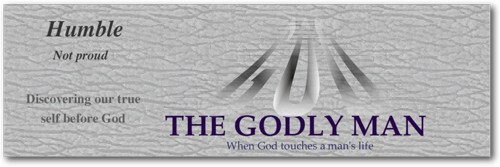
The Godly Man:
When God Touches a Man's Life
Paul J. Bucknell
Dying to Self
The Power of Christian Living Brief study on Romans 6-8
The truths gleaned from Romans 6-8 are critical for establishing a strong Christian life. Why is this? What truths are powerfully presented here in Romans?
The Pattern
Paul applies the pattern of Christ's life to our Christian lives. Paul enables us to get a grasp of this through the picture of baptism - the down and up. Baptism doesn't mean to sprinkle but to immerse.
A Christian does not merely acknowledge that Jesus is the Christ, he also follows Christ. He acknowledges both the value of what Christ has done on the cross and the importance on how Jesus redeemed us. 
We often focus on what Christ has accomplished through His death. Paul speaks clearly of this in chapters 3 and 4 of Romans.
Chapter 5, however, develops the basis of our union with Christ. We are united with Christ by our faith. Starting in chapter 6, we see how this identification with Christ affects our life.
The picture of baptism includes three aspects: the going down, being under and the rising. We might think of rinsing a cloth. We take it from the air, submerge it under water and then bring it out to be used. Humility speaks of the first two steps.
Many would like to avoid the implications of these first two important steps. They want to claim to have eternal life with no sense of repentance - no dying. They have not died to themselves. There has been no funeral. This concept is key to living a fulfilled Christian life.
The Problem
Paul seems to have discovered a group of people that claim Christ's death but deny any real identification with Christ in the death process. Christ merely paid for their sins as some historical fact (which it was of course). They want to forget about their close identification with Christ in this process.

If we consider Christ's death to be all so important (and it is), then we need to realize its effect on our lives. When Jesus died, He not only bore our sins, but He also was, in a final way, saying "no" to sin. After death, sin had no part of His life. He had no earthly flesh that begged to be given special preference.
Purchase The Godly Man and its ten studies in easy epub or pdf format!
So we, as His disciples, must identify with Christ's death and resurrection. We must say "no" to our former allegiance to sin through our faith and "yes" to our allegiance to Christ. We now have a new focus on life. Because of this new allegiance, we are not to sin but to live for God.
For the death that He died, He died to sin, once for all; but the life that He lives, He lives to God. Even so consider yourselves to be dead to sin, but alive to God in Christ Jesus. Therefore do not let sin reign in your mortal body that you should obey its lusts (Romans 6:10-12).
Pride: Hate it!
We will never be able to die to ourselves unless we are convinced that serving the flesh (our old nature) is totally unprofitable. We have to see that it has absolutely no worth. We need to come to detest its very presence.
On the other hand, we must come to love the Spirit's ways. We are to see the glorious work of the Spirit in contrast to the flesh. By seeing their contrasting ways, we hate one and love the other. We refuse to serve our own self's preferences and become wholly loyal to the Holy Spirit's work in our lives.

We cannot rid ourselves of the flesh on this earth. This is what Jesus referred to in 6:10 when he says, "Consider yourselves to be dead to sin." It is still there. If we are not careful, we will serve it. But we don't have to. By voiding our allegiance to our flesh, we can, by Christ's grace, be set free to serve Christ. How do we void our former allegiance to our flesh? Paul says death is the only means and explains it carefully in Romans 7:1-6.
The point is that unless we are absolutely convinced the flesh is a destroyer, we will continue to listen and follow it. We will, in essence, continue to serve it. As Christians we are technically free from its ruling over us, but we still could serve the old self. The follow up question is whether we really hate the flesh.
Are we really convinced?
Paul convincingly set forth this case in the last part of chapter 7 and the early part of 8. Whenever he would go by the old nature, he would serve his own self and bear evil results. But he wanted to serve Christ (Romans 7) which bring forth the fruit of the Spirit. (Galatians 5). The flesh always brings about death because it is hostile to God (Romans 8). We ought not live for our bodies. We do not need to live for ourselves.
We need to humble ourselves by stating that serving ourselves is not good. In a sense this is what 'dying to self' essentially means. We recognize serving self is no good and so we choose to serve the Spirit. These chapters provide a lot of help in convincing us of the horrible nature of the flesh and the glory of the Spirit.
Commitment to saying "no" to the old nature comes only as much as:
1) We are sure of the old nature's total rebellion against God and
2) We desire to serve the Spirit.
Our growth comes as we recognize the complete rebellious nature of the flesh and power of the new life through the life of Christ.
Dying to self means simply a mental check on our determination not to live for oneself and to live for Christ. Paul in 1 Corinthians 15:31 say, "I die daily."
This is a regular battle. A daily battle. Paul, as a veteran apostle, witnessing many miracles, seeing a revelation of Christ, still had to personally die to himself. We do too. We cannot afford not to.
Here is a possible prayer for your early morning meditation.
"Dear Lord, my allegiance to You will be tested today. Right now, I am stating my faithfulness to you. You are the One I love forever. At the same time, I will clearly state that I want nothing to do with serving my self. I have had enough to do with that selfish ego of mine that tries to get all the attention it can. Your principles of love and giving are what I want. Radiate in my life through acts and words of kindness. Forgive me of my sin and cleanse me. I make myself totally empty of self so that You can fill me with your precious Holy Spirit. Lead me forth. I will follow in your humble paths of love."
The Christian needs to acknowledge the flesh, declare its lousy nature, reject its promptings, acknowledge the Lord's presence, the beautiful nature of the Spirit and affirm one's total heart and will to the Spirit's leading.
Christian life is based on humble living. When we are willing to humble ourselves by looking at the facts of what self-service does, then we are willing to walk in that path.
Next => Learning from Moses: A Most Humble Man on Earth Psalm 90
Humble, not Proud: A Biblical series on Humility |
||
info@foundationsforfreedom.net
Scriptures typically quoted from the New American Standard Bible unless noted:
(C) Copyright The Lockman Foundation 1988











